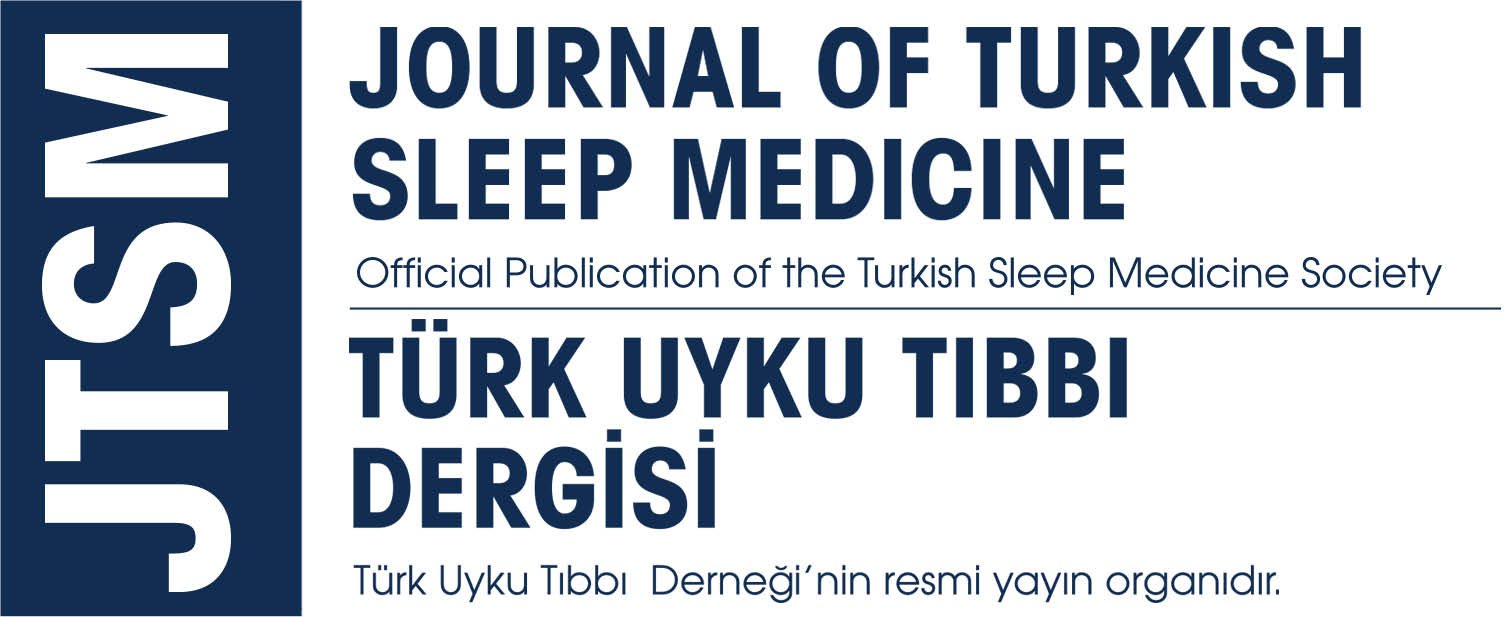Abstract
Objective
The study retrospectively evaluated the effects of quetiapine on sleep in primary insomnia and neurodegenerative diseases using polysomnographic data.
Materials and Methods
Results
Between January 1, 2010, and June 1, 2023, the records of 49 patients who were followed up in the sleep outpatient clinic of the neurology department of our hospital and who underwent polysomnography examination were retrospectively reviewed. Patients aged between 18 and 65 years with primary insomnia and neurodegenerative diseases were included in the study. The mean age of 49 patients (26 females and 23 males) were 56.67 years. The mean quetiapine dose was 59.37. Sleep latency, stage 1 (N1) duration, stage 2 (N2) duration, mean and minimum SO2 and apnea-hypopnea index were similar. Total sleep duration, stage 3 (N3) duration and rapid eye movement (REM) sleep duration were higher in neurodegenerative patients. N3 duration was shorter in patients with primary insomnia on quetiapine. Sleep duration and REM duration were longer in the neurodegenerative group and sleep latency was longer in primary insomnia in quetiapine users. Among quetiapine users, the N2 sleep percentage was higher and the non-REM 3 sleep percentage was lower in primary insomnia, whereas there was no difference in sleep percentages in neurodegenerative patients.
Conclusion
Quetiapine is an atypical antipsychotic agent. It shortens sleep latency and decreases the percentage of REM sleep and wake time. It increases total sleep time, sleep efficiency, and N2 sleep. In this study, in primary insomnia patients using quetiapine, N3 sleep duration was shorter and sleep percentage was lower, whereas N2 sleep percentage was longer. There has been no placebo-controlled study of any antipsychotic drug for treating insomnia.
Keywords:
Quetiapine, primary insomnia, neurodegenerative diseases, polysomnography
References
1Scharre DW, Chang SI. Cognitive and behavioral effects of quetiapine in Alzheimer disease patients. Alzheimer Dis Assoc Disord. 2002;16(2):128-130.
2Pae CU, Nassir Ghaemi S, Kim TS, et al. Rapid titration versus conventional titration of quetiapine in the treatment of bipolar mania: a preliminary trial. Int Clin Psychopharmacol. 2005;20(6):327-330.
3Milia A, Mascia MG, Pilia G, et al. Efficacy and safety of quetiapine treatment for delusional parasitosis: experience in an elderly patient. Clin Neuropharmacol. 2008;31(5):310-312.
4Thase ME, Montgomery S, Papakostas GI, et al. Quetiapine XR monotherapy in major depressive disorder: a pooled analysis to assess the influence of baseline severity on efficacy. Int Clin Psychopharmacol. 2013;28(3):113-120.
5Merims D, Balas M, Peretz C, Shabtai H, Giladi N. Rater-blinded, prospective comparison: quetiapine versus clozapine for Parkinson's disease psychosis. Clin Neuropharmacol. 2006;29(6):331-337.
6Kamphuis J, Taxis K, Schuiling-Veninga CC, Bruggeman R, Lancel M. Off-Label Prescriptions of Low-Dose Quetiapine and Mirtazapine for Insomnia in The Netherlands. J Clin Psychopharmacol. 2015;35(4):468-470.
7Debernard KAB, Frost J, Roland PH. Quetiapine is not a sleeping pill. Tidsskr Nor Laegeforen. 2019;139(13).
8Alastal Y, Hasan S, Chowdhury MA, et al. Hypertriglyceridemia-Induced Pancreatitis in Psychiatric Patients: A Case Report and Review of Literature. Am J Ther. 2016;23(3):947-949.
9Glocker C, Grohmann R, Schulz H. Fatal Agranulocytosis Associated With Quetiapine in Monotherapy: A Case Report. J Clin Psychopharmacol. 2017;37(5):625-627.
10Nanasawa H, Sako A, Mitsutsuka T, et al. Development of diabetes mellitus associated with quetiapine: A case series. Medicine (Baltimore). 2017;96(3):e5900.
11Zenno A, Leschek E. Quetiapine-Induced Central Hypothyroidism. J Am Acad Child Adolesc Psychiatry. 2020;59(5):575-576.
12Schattner A, Kitroser E, Cohen JD. Fatal Neuroleptic Malignant Syndrome Associated With Quetiapine. Am J Ther. 2016;23(5):1209-1210.
13Monti JM, Torterolo P, Pandi Perumal SR. The effects of second generation antipsychotic drugs on sleep variables in healthy subjects and patients with schizophrenia. Sleep Med Rev. 2017;33:51-57.
14Thompson W, Quay TAW, Rojas-Fernandez C, Farrell B, Bjerre LM. Atypical antipsychotics for insomnia: a systematic review. Sleep Med. 2016;22:13-17.
15Anderson SL, Vande Griend JP. Quetiapine for insomnia: A review of the literature. Am J Health Syst Pharm. 2014;71(5):394-402.
16Riemann D, Baglioni C, Bassetti C, et al. European guideline for the diagnosis and treatment of insomnia. J Sleep Res. 2017;26(6):675-700.
17Sateia MJ, Buysse DJ, Krystal AD, Neubauer DN, Heald JL. Clinical Practice Guideline for the Pharmacologic Treatment of Chronic Insomnia in Adults: An American Academy of Sleep Medicine Clinical Practice Guideline. J Clin Sleep Med. 2017;13(2):307-349.
18Tanne JH. AstraZeneca pays $520m fine for off label marketing. BMJ. 2010;340:c2380.
19Cohrs S, Gade K, Meier A, et al. Quetiapine improves sleep disturbance in acute bipolar disorder: a case series. Pharmacopsychiatry. 2010;43(4):154-155.
20Gedge L, Lazowski L, Murray D, Jokic R, Milev R. Effects of quetiapine on sleep architecture in patients with unipolar or bipolar depression. Neuropsychiatr Dis Treat. 2010;6:501-508.
21Chakravorty S, Hanlon AL, Kuna ST, et al. The effects of quetiapine on sleep in recovering alcohol-dependent subjects: a pilot study. J Clin Psychopharmacol. 2014;34(3):350-354.
22Cohrs S, Rodenbeck A, Guan Z, et al. Sleep-promoting properties of quetiapine in healthy subjects. Psychopharmacology (Berl). 2004;174(3):421-429.
23Karsten J, Hagenauw LA, Kamphuis J, Lancel M. Low doses of mirtazapine or quetiapine for transient insomnia: A randomised, double-blind, cross-over, placebo-controlled trial. J Psychopharmacol. 2017;31(3):327-337.
24Wiegand MH, Landry F, Brückner T, Pohl C, Veselý Z, Jahn T. Quetiapine in primary insomnia: a pilot study. Psychopharmacology (Berl). 2008;196(2):337-338.
25Tassniyom K, Paholpak S, Tassniyom S, Kiewyoo J. Quetiapine for primary insomnia: a double blind, randomized controlled trial. J Med Assoc Thai. 2010;93(6):729-734.
26Linselle M, Sommet A, Bondon-Guitton E, et al. Can drugs induce or aggravate sleep apneas? A case-noncase study in VigiBase((R)), the WHO pharmacovigilance database. Fundam Clin Pharmacol. 2017;31(3):359-366.
27Juri C, Chaná P, Tapia J, Kunstmann C, Parrao T. Quetiapine for insomnia in Parkinson disease: results from an open-label trial. Clin Neuropharmacol. 2005;28(4):185-187.
28Juri C, Chaná P, Tapia J, Kunstmann C, Parrao T. Quetiapine for insomnia in Parkinson disease: results from an open-label trial. Clin Neuropharmacol. 2013;16(8):1733-1744.



